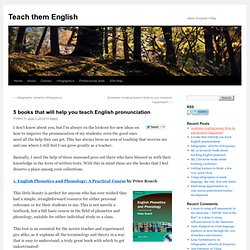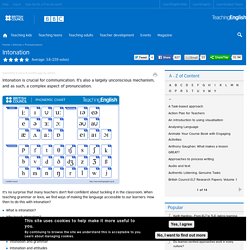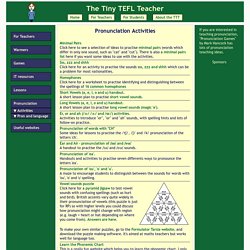

5 books that will help you teach English pronunciation. I don’t know about you, but I’m always on the lookout for new ideas on how to improve the pronunciation of my students; even the good ones need all the help they can get.

This has always been an area of teaching that worries me and one where I still feel I can grow greatly as a teacher. Basically, I need the help of those seasoned pros out there who have blessed us with their knowledge in the form of written texts. With this in mind these are the books that I feel deserve a place among your collections. 1. English Phonetics and Phonology: A Practical Course by Peter Roach This little beauty is perfect for anyone who has ever wished they had a simple, straightforward resource for either personal reference or for their students to use. This text is an essential for the novice teacher and experienced pro alike, as it explains all the terminology and theory in a way that is easy to understand; a truly great book with which to get indoctrinated! 2. By Robin Walker 3. By Paul Tench 4. 5. PRONUNCIATION. Pronunciation Apps for ESOL. Intonation. It's no surprise that many teachers don't feel confident about tackling it in the classroom.

When teaching grammar or lexis, we find ways of making the language accessible to our learners. How then to do this with intonation? What is intonation? Why teach intonation? Can I improve my own awareness of intonation? What is intonation? It's divided into phrases, also known as 'tone-units'. Why teach intonation? Awareness of intonation aids communication. Though it's unlikely our learners will need native-speaker-level pronunciation, what they do need is greater awareness of intonation to facilitate their speaking and listening. Can I improve my own awareness of intonation? How I help my students Awareness-raising Some techniques I find useful for raising learners' awareness of intonation: Provide learners with models - don't be afraid to exaggerate your intonation.
Intonation doesn't exist in isolation. Some examples are: Intonation and discourse A simple shopping dialogue demonstrates this: Easy Ways To Teach Pronunciation. Teaching English Pronunciation. I've met teachers who believe "there's no point in teaching English pronunciation as it cannot be taught.

Talented students pick it up - the rest don't. " English coursebooks make the same point with their silence. Apart from a few exercises on word stress or individual sounds - and then only in the better books - they ignore pronunciation. Despite the above comments, I know from my own experience that clear pronunciation can be taught - and that when it is taught the students listening will improve too. I want to be clear that I'm not trying to make my learners sound like the Queen of England or the President of the United States - or even like me. What needs teaching? In teaching English pronunciation the students generally need work in several areas.
Individual Sounds - Background Teaching English pronunciation involves a giving a lot of listening practice at the beginning. Remember that sounds and letters are different. Pronunciation Activities. Minimal Pairs Click here to see a selection of ideas to practise minimal pairs (words which differ in only one sound, such as "cat" and "cut").

There is also a minimal pairs list here if you want some ideas to use with the activities. Sss, zzz and shhh Click here for an activity to practise the sounds sss, zzz and shhh which can be a problem for most nationalities. Homophones Click here for a worksheet to practise identifying and distinguishing between the spellings of 16 common homophones Short Vowels (a, e, i, o and u) handout.
A short lesson plan to practise short vowel sounds. Long Vowels (a, e, i, o and u) handout. A short lesson plan to practise long vowel sounds (magic 'e'). Er, or and ah (/ɜ:/ /ɔ:/ and /ɑ:/) activities. Activities to introduce "er", "or" and "ah" sounds, with spelling hints and lots of follow-on practice. Adrian Underhill on Successful Pronunciation 1 (Macmillan)
Sound English: literacy for pre-literate adults. BBC Learning English. English Language lessons - Pronunciation Course. Links : Pronunciation.